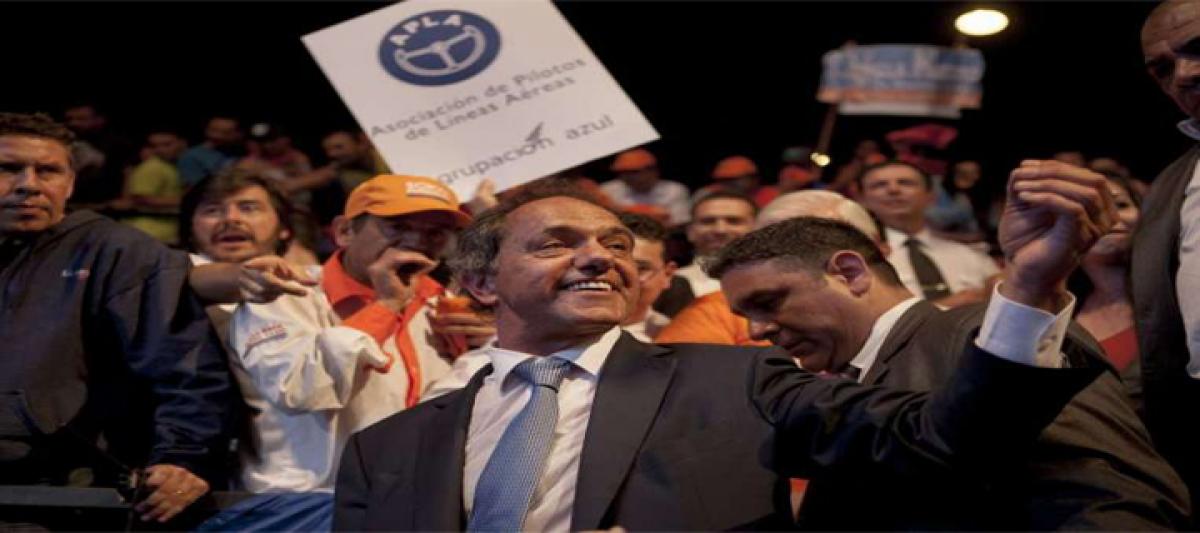Live
- G20 Leaders Will Talk About Climate, Taxes, and Trump's Return in Brazil
- COP29: CDRI announces $8 million funding for 12 projects to address climate crisis
- Anti-Telgu remarks: Actor Kasthuri Shankar moves court for bail
- Samsung AR Smart Glasses Set to Launch in 2025, Featuring Ray-Ban Meta-Like Design
- Kerala Industries Minister confident that new policy will boost plantation sector
- Madras HC plans inter-departmental monitoring committee to combat drug use in TN
- Bihar: Spotted deer dies due to heart attack in Banka district
- Mushtaq Ali T20: Shami to spearhead Bengal bowling attack, Gharami named captain
- Kharge's clarion call to oust Maharashtra's BJP-backed MahaYuti
- Why Ukraine’s Use of US Missiles Against Russia Could Lead to World War 3
Just In

x
Highlights
Argentina votes for its next president today after 12 years under power couple Nestor and Cristina Kirchner, whose heir apparent is poised to win but may undo parts of their controversial legacy.
Argentina votes for its next president today after 12 years under power couple Nestor and Cristina Kirchner, whose heir apparent is poised to win but may undo parts of their controversial legacy.

Buenos Aires provincial Governor Daniel Scioli has vowed to uphold the core elements of "kirchnerism," a populist creed built around trade protectionism, social welfare and defense of the working classes.
But the 58-year-old powerboating fanatic -- who lost his right arm in a 1989 racing accident -- has also vowed a change in style to attract more investment and increase productivity, and has assembled an economic team of free-marketeers.
His top rival is Buenos Aires Mayor Mauricio Macri, the candidate of Argentines fed up with what they see as the Kirchners' heavy-handed economic policy and belligerent politics.
Macri, 56, rose to prominence as the boss of Argentina's most popular football club, Boca Juniors, which won a string of titles under his reign.
There may also be a spoiler in the form of Sergio Massa, a former Kirchner ally who fell out with the president and launched a rival party, the Renewal Front, two years ago.
Under Argentine electoral law, in order to win outright in the first round a candidate must claim more than 45 per cent of the vote, or at least 40 per cent with a margin of 10 points over the runner-up.
Opinion polls put Scioli just shy of 40 per cent, with Macri at around 30 per cent and Massa at around 20 per cent.
That means the country could be headed for its first-ever run-off election, on November 22.
"There's no doubt about who will come in first and second. The real question is whether there will be a second round," said pollster Ricardo Rouvier.
End of an Era
Nestor Kirchner came to office in 2003, in the aftermath of a devastating economic crisis that triggered what was then the largest sovereign debt default in history and sparked deadly riots in the streets.
He presided over a stunning turnaround underpinned by average economic growth of more than eight percent a year, fueled by high prices for Argentina's agricultural exports.
He handed power to his wife in 2007. They were widely expected to continue this term-for-term tango, but Nestor died of a heart attack in 2010.
Cristina, a fiery former senator, defended his legacy all the more combatively and won re-election in 2011.
But the economic magic of the early Kirchner years has faded.
When Argentina's next president takes office on December 10, he will inherit a country troubled by inflation, an overvalued currency and an economy facing what the International Monetary Fund predicts will be a 0.7 per cent contraction next year.
Argentina, Latin America's largest economy after Brazil and Mexico, is also still waging a messy legal battle against two American hedge funds that reject its plans to restructure the $100 billion in debt it defaulted on in 2001.
The firms, which Kirchner condemns as "vulture funds," successfully sued for full payment in US federal court. Kirchner's refusal to pay them pushed Argentina into a new default last year.
Her tenure has also been marked by acrimonious battles with big media, the courts and old Falklands War enemy Britain.
"The world is going to watch the new president's first 24 hours very carefully. He'll have to deliver a message to convince people that Argentina is a country where they can invest, with clear rules," said political analyst Pablo Knopoff.
Argentina's 32 million voters, who are required to cast ballots, are also electing their representatives in Congress and regional bloc Mercosur. Eleven of the country's 23 provinces are also electing governors and other officials.
The first results are expected around 9:00 pm (midnight GMT).
But pollsters have warned the numbers are so close that counting could stretch well into the night.

Next Story
More Stories
ADVERTISEMENT
© 2024 Hyderabad Media House Limited/The Hans India. All rights reserved. Powered by hocalwire.com







